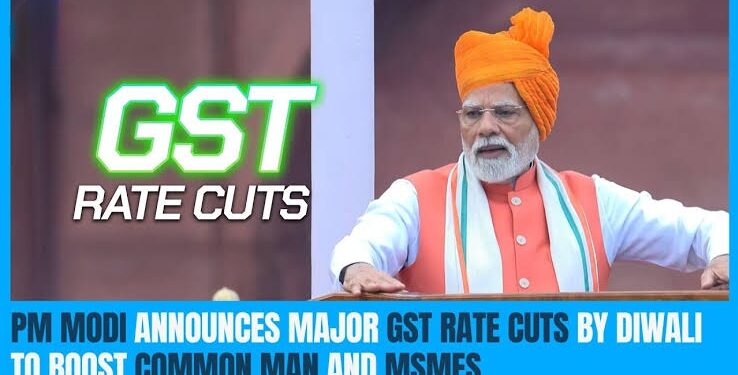Prime Minister Narendra Modi on Friday announced a sweeping overhaul of the Goods and Services Tax (GST), promising “next-generation reforms” that will significantly ease the tax burden on households, farmers, small businesses, and the middle class.
Speaking from the Red Fort on India’s 79th Independence Day, Modi said a new simplified structure would be rolled out soon, with most rate reductions expected before Diwali. “This Diwali, I am going to make it a double Diwali for you. You will get a very big gift,” he told the nation.
According to officials, the government is considering replacing the current four-tier GST system — 5%, 12%, 18%, and 28% — with just two primary slabs of 5% and 18%, along with a 40% “demerit” rate for luxury and sin goods.
If cleared by the GST Council, the restructuring will sharply lower the cost of essentials, household items, medicines, agricultural equipment, and education services. Nearly 99% of items currently taxed at 12% are set to move down to 5%, while around 90% of products in the 28% slab — including cement, televisions, refrigerators, and washing machines — will shift to 18%.
Everyday products such as pasta, namkeens, umbrellas, bicycles, utensils, and footwear under ₹1,000 could see prices fall, while high-value goods like air-conditioners and dishwashers may become more affordable. Cigarettes and online gaming, however, will attract a new 40% levy, replacing the existing cess system.
Diamonds, gold, and silver will retain their current special rates, while petroleum products will continue to remain outside GST.
Finance ministry officials said the proposals have been forwarded to the Group of Ministers on rate rationalisation and are likely to be taken up in the GST Council meeting in October, with a final decision expected ahead of Diwali.
Tax experts welcomed the move, calling it the most significant reform to India’s indirect tax regime since GST’s rollout in 2017. Deloitte India’s MS Mani noted that a two-rate structure would reduce classification disputes, while EY India’s Saurabh Agarwal said the reforms would boost domestic consumption and make Indian exports more competitive.
Officials added that revenue losses from lower tax rates would be offset by an expanded tax base, higher compliance, and a surge in consumption.
“This reform will make essentials cheaper, empower MSMEs, and strengthen our economy,” Modi said, calling it a decisive step towards building a resilient and self-reliant India.




























